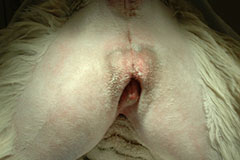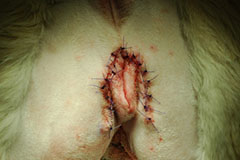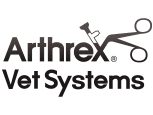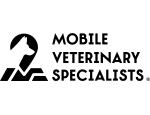Irritation to the skin around the vulva, or vulvar fold dermatitis, is caused when there excessive skin or folds of skin around the peri-vulvar area. This can be due to obesity, breed conformation, or due to early neutering (juvenile vulva). These excessive skin folds can lead to the accumulation of urine and vaginal secretions. A moist, dark environment is created where bacteria and yeast can thrive, resulting in vulvar fold dermatitis (Figure 1). This can also lead to recurrent urinary tract infections, vaginal infections, and urinary incontinence. Episioplasty, also known as vulvoplasty, is a reconstructive surgical procedure performed to remove excess skin folds around the vulva to provide better ventilation of the area.

- Licking at the vulva
- Scooting
- Foul odor and/or vaginal discharge
- Frequent or bloody urination
- Red, irritated skin around the vulva
- Inappropriate urination or incontinence
- Frequent or persistent urinary tract infections
Your veterinarian will want to perform a thorough work up on your pet to ensure that there are no other underlying issues. This condition can usually be diagnosed on a physical exam. However, secondary diseases should also be identified and treated. Therefore, your veterinarian will likely perform blood screening to check kidney function and for signs of infection. Tests can include a complete blood count (CBC), serum chemistry, and urine check. A culture of the urine may also be required. They may also recommend skin testing of any active infection of the skin around the vulva. This could include a skin scrape, cytology, and/or culture. A ultrasound of the bladder can also help rule out other causes of urinary dysfunction such as a mass or ectopic ureters.
Medical management of vulvar fold dermatitis with oral antibiotics, topical antibiotics, cleansing, drying agents, or lotions may be successful, but is often unrewarding. For the majority of cases surgery is warranted. Any active infection should be cleared prior to surgery, so your surgeon will likely start these therapies to prepare your pet for the most successful procedure.
Surgical treatment (episioplasty), is a reconstructive procedure aimed at removing the extra skin folds around the vulva. The amount of perivulvar skin to be removed is determined by pinching the redundant skin between the thumb and forefingers. A crescent-shape incision is made around the vulva and the excessive skin and subcutaneous tissue is removed (Figure 2). The wound is closed which pulls the vulva out from the extra skin.

It is very important to allow the surgical site time to heal for the best possible outcome. Pets should be kept confined and prevented from licking or rubbing the surgical site until it is completely healed. An Elizabethan collar or wound covering will be required to protect the area. Oral pain medications and antibiotics are warranted. Cold compresses of the area immediately after surgery can help with decreasing inflammation.
Complications from this procedure include opening of the wound (dehiscence), infection, or not removing enough skin. It’s also important to note that this condition can be complicated by other factors, so the surgery may not completely resolve clinical signs.
The prognosis after episioplasty is excellent after healing. Pets should be monitored for recurrence of signs and kept lean to prevent further excess skin from developing.












